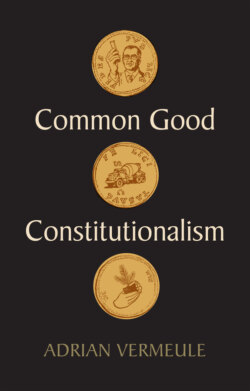Читать книгу Common Good Constitutionalism - Adrian Vermeule - Страница 18
Competitors to the Classical Tradition
ОглавлениеAs the last point shows, I offer not only a positive account of the common good in public law, but plenty of negative claims as well – critiques of the prominent alternatives. Today, public law and legal theory are dominated by two forces. On the one hand there is progressive constitutional law, which treats the courts as an arena for a liberationist agenda and the law as an instrument for advancing that agenda. On the other hand there is the conservative legal movement, which has largely tied itself to a particular constitutional method, “originalism” – in the version I focus on here, essentially a form of positivism that claims to interpret enacted text according to its original public meaning.32
Since its modern inception in the 1960s and 1970s, originalism has never been able to free itself from – or even to acknowledge – the implicit normative assumptions and judgments needed to attribute rationality to legal texts, to determine the level of generality at which the meaning of constitutional texts should be read, and otherwise to make sense of their terms. Thus originalism is, in that sense, an illusion; it proves impossible to avoid interpretation that rests on controversial normative judgments at the point of application, especially in hard cases. The consequence is that even putatively originalist decisions of the Supreme Court turn out to be richly interpretive, richly Dworkinian. They are shot through with implicit and explicit justification in light of claims about political morality – including, where appropriate, deference to other institutions based on political role morality.
Because no law can operate without some implicit or explicit vision of the good to which law is ordered, originalism has no natural immunity against infection from without by whatever theory of the good judges and other legal actors interpolate into the law. Unsurprisingly, then, the illusory positivism of the conservative legal movement has largely been hollowed out and taken over by a substantively libertarian constitutional vision – an extremely well-funded libertarian vision. Originalist-libertarians purport to be horrified by purposive rule for the common good even as they defend the role of common-law judges in defining and protecting property rights. They evince hostility to the administrative state, except for the parts of the administrative state that promote the smooth functioning of financial services and the broader economy, and angrily condemn any departures from the putative original understanding, except in areas such as political free speech rights for corporations, gun rights, and “takings” of property rights, in which the law propounded by conservative judges is either expressly or arguably non-originalist. On social matters, originalist judges have written expressly originalist opinions, such as the decision in Bostock v. Clayton County,33 reaching results that almost no one alive at the time of the law’s enactment would conceivably have thought desirable or even defensible. It is a strange originalism indeed that would be unanimously voted down by the enacting generation.
The larger significance of all this is methodological: both progressivism and originalism (in the version I focus on here) are positivist approaches, albeit in somewhat different ways:
[T]he terms of many debates in American jurisprudence … generally oscillate between two mostly positivistic poles: progressive moralism and conservative originalism. In the mainstream one can only choose between the revolutionary positivism of the progressive, who denies substantively the normative claims of the natural law in the name of the liberation of the individual will, and the academic, genteel positivism of the originalist, who denies methodologically the normative claims of the natural law in the name of preserving the will of semi-mythical lawgivers. The U.S. Supreme Court’s decision in Bostock v. Clayton County has revealed a late fruit of this brambled garden: progressive originalism, the method of the conservative, now perfected at the service of the progressive’s ends.34
Later I will illustrate and explain the convergence that produces an originalism indistinguishable from progressive living constitutionalism. For now, the key methodological point is just that originalism and progressivism both stand on the same side of a gulf that separates them from the classical legal tradition.
